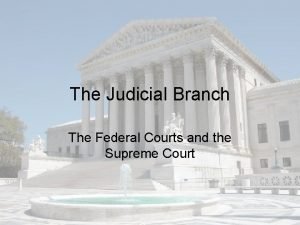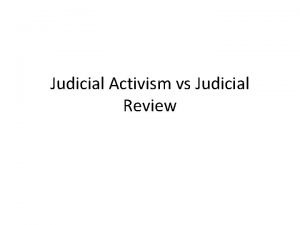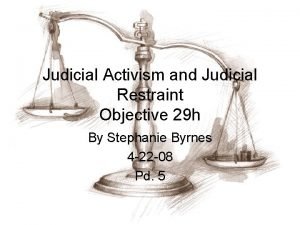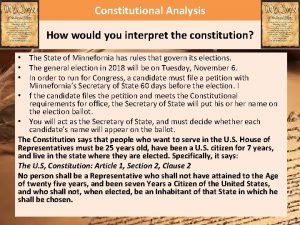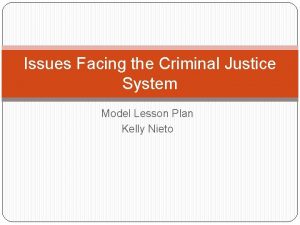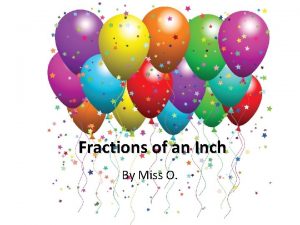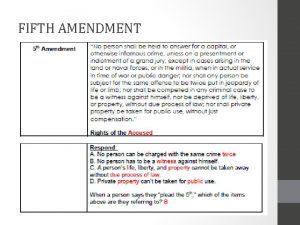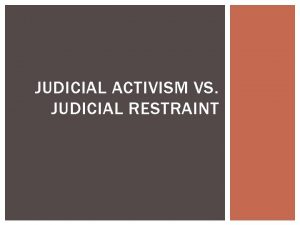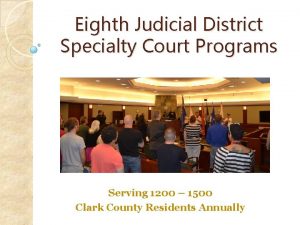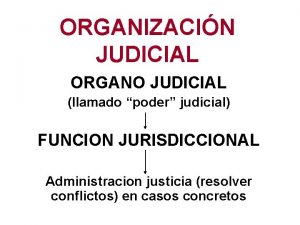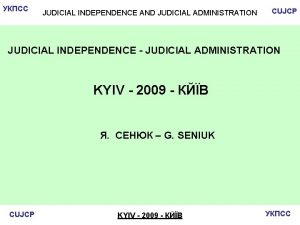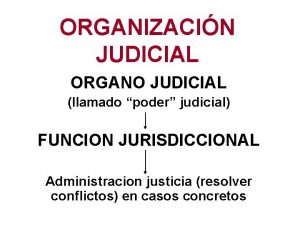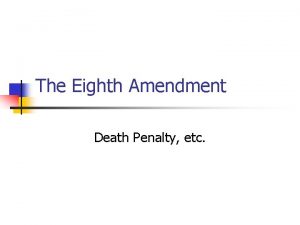Judicial Conference of the Eighth Judicial District May











- Slides: 11

Judicial Conference of the Eighth Judicial District May 10 – 12, 2018

Mary K. Whitmer Mary regularly represents receivers and trustees, secured and unsecured creditors, debtors and those seeking to purchase assets out of bankruptcy estates. A certified public accountant, she has served as a Chapter 7 panel trustee in the Northern District of Ohio. As in-house general counsel to the Dottore Companies, she completes the full-service profile of a leading receivership and litigation firm, uniting practical business intelligence and accounting assistance with legal sophistication.

Williams v. Schneider, 2017 Ohio 9152 (8 th Dist. Ohio App. ) üPlan to administer the case which provided for a 10% surcharge on assets administered by the Receiver, entered into in 2007, was affirmed. üInjunction in Receiver’s Order, prohibiting all parties from commencing or continuing “any action at law or suit or proceeding in equity” to secure an advantage on Receivership assets in the hands of the court, was “ambiguous. ” üThe actions of Parma Heights to certify its special assessment were permitted under the principles of equity. üPre-statutory sales of property free and clear of liens are permitted. üCorking good discussion of lien priorities.

Ohio Revised Code § 2735. 04: Sales of Property Free and Clear of Liens 2735. 04(D)(1) – A Receiver may sell Free and Clear of Liens üSubject to the approval and supervision of the Court. üSale can be by written contract, private or public auction, or any other method that the Court determines is “fair, ” “reasonable in the circumstances, ” and “will maximize return” to the Estate. üBefore entering an order for sale of the property, the Court may require that the Receiver provide evidence of the value of the property.

Ohio Revised Code § 2735. 04: Sales of Property Free and Clear of Liens (con’t. ) 2735. 04(D)(2) – A Sale of Real Property Free and Clear of Liens is permitted only after ALL of the following events: üAn application is made by the Receiver or the first mortgage holder that requests the Receiver be granted authority to sell and sets forth the identity of the buyer and the proposed sale terms or if there is no specific offer, the proposed procedures for the conduct of the sale. üTen days written notice in accordance with the Rules of Civil Procedure to parties in interest, including litigants, owners of the real property and lienholders. üLienholders identified in a Preliminary Judicial Report that is filed with the application, must be notified. üOpportunity for hearing, but if there are no objections, no hearing is required.

Ohio Revised Code § 2735. 04: Sales of Property Free and Clear of Liens (con’t. ) 2735. 04(D)(3) – Court’s Order must allow the owner a reasonable time but not less than three days to exercise his right of redemption in the real property.

In re Disqualification of Mc. Gee, 127 Ohio St. 3 d 1230 (2009 Ohio 7203) üJud. Cond. R. 2. 9 prohibits judges from engaging in communications concerning a pending or impending matter outside the presence of the parties or their lawyers. üA court-appointed receiver is not an adversarial party. üJud. Cond. R. 2. 9(A)(3) permits a judge to “consult with staff and court officials whose functions are to aid the judge in carrying out the judge’s adjudicative responsibilities. . . provided the judge makes reasonable efforts to avoid receiving factual information that is not part of the record and does not abrogate the responsibility personally to decide the matter. ” üA court-appointed receiver qualifies court personnel “whose functions are to aid the judge in carrying out the judge’s adjudicative responsibilities. ” (See Starr v. Dotsikas, 1998 WL 456408 (8 th Dist. No. 73201).

Yidi LLC v. JBH Hotel, LLC et. al. , 2017 Ohio 1285 (8 th Dist. Ohio App. ) üOhio law recognizes that mortgagors have an equitable right of redemption to pay the debt, interest, and court costs to prevent the sale of property. üAppellants offer, although the highest, was not in compliance with the bidding procedures. üThe three-day period to allow a mortgagor to exercise its equitable right to redeem is adequate and reasonable. üBy failing to object to the bidding procedures, appellants waived their right to object to a sale that complied with the bidding procedures. üAlthough appellants offer was the highest, it was üAll parties were aware that the Receiver not the “best” because failed to demonstrate intended to sell the property and therefore had financing capability (among other issues). a fair amount of time to redeem. üBidding procedures will be enforced, where they were filed with and approved by the Court.

Haber Polk Kabat, LLP, et. al. v. The Condominiums at Stonebridge Owners’ Association, Inc. , 2017 Ohio 8069 (8 th Dist. Ohio App. ) ü Appointment of a receiver is an extraordinary remedy. ü Need for a receiver must be established by clear and convincing evidence. ü Even though the complaint does not request the appointment of a receiver and there is no motion to appoint a receiver before the Court, a trial court may appoint a receiver sua sponte when the circumstances warrant it. ü The trial court may appoint a receiver without conducting an evidentiary hearing. ü Here the trial court waited nearly ten months, after it had conferences with the parties and was thoroughly familiar with the relevant facts and issues of the case. ü The facts and circumstances supporting a receiver were established by the “admitted facts and circumstances of this case. ”

In re Helligrath, 569 B. R. 709 (S. D. Ohio Bankr. 2017) üPriority of payment set forth in the Bankruptcy Code primes any priority scheme of payment contained in the Receivership Order. üWhile a receiver is generally paid out of the receivership corpus, neither the Receivership Order, nor the Ohio receivership statute and case law provides the Receiver with a judicial lien on the receivership estate. üWhile courts have “suggested” that a receiver’s expenses should be made a charge against the receivership corpus to protect payment to the receiver, explicit lien-creating language is necessary to provide a receiver with a charge or lien against receivership property that would arise to the level of a property interest. üReceiver’s fees associated with management of property both pre- and post- bankruptcy were paid in concurrent monthly payments to the secured creditor before making payments on other claims in the bankruptcy.

Fifth Third Bank v. CHGC, Inc. , 2016 Ohio 5767 (9 th Dist. Ohio App. ) üA mortgage may contain a provision or multiple provisions for the appointment of a receiver, and the borrower’s consent manifested by the execution of the mortgage is an adequate, equitable basis for the appointment of a receiver. üUpon the appointment of a receiver pursuant to the provisions of the debtor’s loan documentation, the trial court is not limited to the grant of powers and authority in the loan documentation. üOnce a receiver is appointed, the trial court may exercise its sound judicial discretion to limit or expand a receiver’s powers as it deems appropriate consistent with Ohio law.
 Judicial activism vs judicial restraint
Judicial activism vs judicial restraint Judicial activism examples
Judicial activism examples Judicial restraint vs judicial activism
Judicial restraint vs judicial activism Judicial activism vs judicial restraint
Judicial activism vs judicial restraint Judicial activism vs judicial restraint
Judicial activism vs judicial restraint 8th commandment catholic
8th commandment catholic Eighth amendment excessive bail
Eighth amendment excessive bail Quarter inch fraction
Quarter inch fraction Taj mahal wonder of the world
Taj mahal wonder of the world Anagram of eighth
Anagram of eighth 8 amendment
8 amendment David g myers psychology 8th edition
David g myers psychology 8th edition
